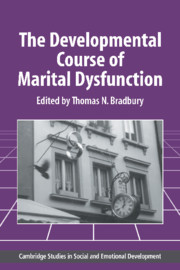Book contents
- Frontmatter
- Contents
- List of Contributors
- Foreword
- Introduction: The Developmental Course of Marital Dysfunction
- Part I Conceptual and Empirical Contributions
- 1 Communication in Early Marriage: Responses to Conflict, Nonverbal Accuracy, and Conversational Patterns
- 2 Marital Aggression, Quality, and Stability in the First Year of Marriage: Findings from the Buffalo Newlywed Study
- 3 Accommodation Processes During the Early Years of Marriage
- 4 The Psychological Infrastructure of Courtship and Marriage: The Role of Personality and Compatibility in Romantic Relationships
- 5 Happiness in Stable Marriages: The Early Years
- 6 Developmental Changes in Marital Satisfaction: A 6-Year Prospective Longitudinal Study of Newlywed Couples
- 7 The Development of Marriage: A 9-Year Perspective
- 8 Premarital Predictors of Relationship Outcomes: A 15-Year Follow-up of the Boston Couples Study
- 9 Optimizing Longitudinal Research for Understanding and Preventing Marital Dysfunction
- 10 Socialization into Marital Roles: Testing a Contextual, Developmental Model of Marital Functioning
- 11 Physical Aggression in Marriage: A Developmental Analysis
- Part II Invited Commentaries
- Author Index
- Subject Index
2 - Marital Aggression, Quality, and Stability in the First Year of Marriage: Findings from the Buffalo Newlywed Study
Published online by Cambridge University Press: 13 October 2009
- Frontmatter
- Contents
- List of Contributors
- Foreword
- Introduction: The Developmental Course of Marital Dysfunction
- Part I Conceptual and Empirical Contributions
- 1 Communication in Early Marriage: Responses to Conflict, Nonverbal Accuracy, and Conversational Patterns
- 2 Marital Aggression, Quality, and Stability in the First Year of Marriage: Findings from the Buffalo Newlywed Study
- 3 Accommodation Processes During the Early Years of Marriage
- 4 The Psychological Infrastructure of Courtship and Marriage: The Role of Personality and Compatibility in Romantic Relationships
- 5 Happiness in Stable Marriages: The Early Years
- 6 Developmental Changes in Marital Satisfaction: A 6-Year Prospective Longitudinal Study of Newlywed Couples
- 7 The Development of Marriage: A 9-Year Perspective
- 8 Premarital Predictors of Relationship Outcomes: A 15-Year Follow-up of the Boston Couples Study
- 9 Optimizing Longitudinal Research for Understanding and Preventing Marital Dysfunction
- 10 Socialization into Marital Roles: Testing a Contextual, Developmental Model of Marital Functioning
- 11 Physical Aggression in Marriage: A Developmental Analysis
- Part II Invited Commentaries
- Author Index
- Subject Index
Summary
Marriage represents one of the most important transition events in the course of individual development. When two individuals marry, it is likely to fundamentally alter their views of themselves and the social world, the nature of their interactions with friends and family, and their transactions with the broader social network (Boss, 1983; McGoldrick & Carter, 1982). Newly weds are thus faced with a set of important and challenging tasks: they must negotiate a satisfactory division of roles and responsibilities; reestablish or redefine ties, both as individuals and as a couple, with each member's extended family and peer network; and learn ways to maintain and nurture their developing relationship. Although these tasks are often begun prior to marriage and continue throughout marriage, the early years of marriage are usually the time in which major conflicts are first revealed and confronted. For example, Suitor, Pillemer, and Straus (1990) report that marital conflict and verbal aggression within the marriage are negatively correlated with age (though this may represent either developmental declines or a winnowing effect of divorce). Consequently, the early years of marriage may represent the period in which marital conflict is the most frequent and most intense. Because a couple's ability to manage marital conflict and reconcile differences may be an important determinant of marital satisfaction and stability (e.g., Gottman, 1979; Markman, Floyd, Stanley, & Storaasli, 1988), the early years of marriage may represent a critical phase for the developmental course of the marriage.
- Type
- Chapter
- Information
- The Developmental Course of Marital Dysfunction , pp. 44 - 73Publisher: Cambridge University PressPrint publication year: 1998
- 35
- Cited by



